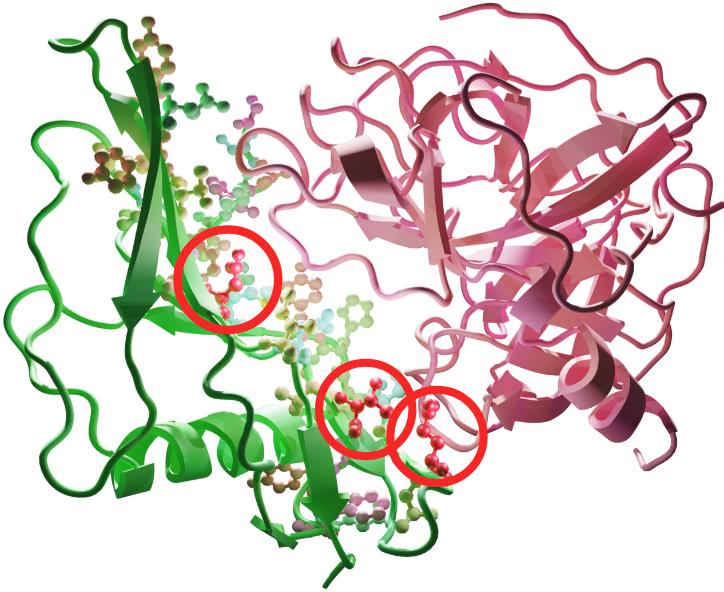Computer Vision – Robotics – AI for Life Sciences
 |
 |
Work with us
Scientific Objectives. Our research explores machine perception, robot learning, and AI-driven protein engineering. In machine perception, we seek to develop embodied systems that perceive, interact with, and learn from dynamic environments. Key challenges include enabling generalization across diverse tasks, achieving data-efficient learning akin to humans, and facilitating shared learning across systems for enhanced scalability and robustness. In protein engineering, we design AI models to understand protein dynamics, enzyme characterization, and molecule discovery. We collaborate with molecular biology experts to bridge computational advances with real-world biochemical challenges, pushing the frontiers of drug discovery and biomolecular engineering. More details about our research can be found here.
Applications. Our research has transformative implications across multiple domains. Advances in machine perception enable assistive robots to autonomously acquire new skills, self-navigating vehicles to handle complex conditions, and smart wearables to guide users in unfamiliar environments. In protein engineering, our AI-driven methods could revolutionize drug discovery, leading to breakthroughs in Alzheimer’s research and novel treatments for acute stroke and other life-threatening diseases. By combining AI and molecular science, we strive to impact healthcare, industry, and daily life.
News:
- Our work on predicting and engineering protein flexibility has been accepted to ICLR 2025 (pre-print).
- Our work on extracting 6D object trajectories from in-the-wild Internet videos has been accepted to ICLR 2025 (project page).
- We are excited to be part of the CLARA center. This is a unique opportunity to bring research on neurodegenerative diseases to the next level, merging AI and supercomputing, across biological scales from molecules to medical imaging.
- Our new benchmark for molecule discovery from mass spectrometry data for metabolomics has been presented as a spotlight (top 2% of submitted papers) at NeurIPS 2024.
- Our work on learning to generate changes of object states has been accepted to CVPR 2024 (website, paper, code).
- Our work on learning protein-protein interactions has been accepted to ICLR 2024 (Paper, project page, demo, news article, interview with Anton Bushuiev and Josef Sivic for Czech Radio (in Czech), related interview for Czech Radio with colleagues at Loschmidt laboratories (in Czech)).
- Our work on Open-Vocabulary 3D Occupancy Prediction from Images has been accepted to NeurIPS 2023 (paper, news article).
- Josef Sivic received ERC Advanced grant.
- Members of the Impact team presented 7 papers at CVPR 2023
- Josef Sivic co-chaired a session on learning from demonstration at IROS 2022
- Members of the Impact team presented 4 papers at ECCV 2022, incl. one oral
- Josef Sivic co-organized the Czech-French AI Workshop on Artificial Intelligence (report)
- The Impact team participated in the European Network of Excellence in Robotics euROBIN
- Paper co-authored by Tomas Pajdla won the Best Paper Award at CVPR 2022 (report)
- Members of the Impact team presented 6 papers at CVPR 2022, incl. one oral and the Best Paper Award
- Our work on learning from Internet videos how to manipulate tools received the Best Poster Award at the 2nd International Workshop on AI for Robotics
- Paper co-authored by Josef Sivic was invited to the TPAMI Special Issue on the Best Papers of ICCV 2021
- Paper co-authored by Tomas Pajdla won the Marr Prize Best Paper Honorable Mention at ICCV 2021 (report)
- Members of the Impact team presented 6 papers at ICCV 2021
- Torsten Sattler gave a keynote (Lessons Learned from Building Benchmarks for Visual Localization) at IROS 2021
- Paper co-authored by Torsten Sattler was shortlisted among the Best Paper Candidates at CVPR 2021
- Members of the Impact team presented 6 papers at CVPR 2021
- Josef Sivic gave a lecture on multi-modal learning at the EEML 2021 summer school
- ELLIS Unit Prague at CIIRC CTU is officially inaugurated
- Our 6D object pose estimation method won a challenge at ECCV 2020
- ELLIS organized an online workshop on how to tackle Covid-19 using methods of machine learning and AI
- Our paper on PLMP – Point-Line Minimal Problems in Complete Multi-View Visibility won the Best Student Paper Award at ICCV 2019
- The European Laboratory for Learning and Intelligent Systems (ELLIS) announced establishment of 17 units, including one at CIIRC CTU in Prague
- Our paper on Estimating 3D Motion and Forces of Person-Object Interactions from Monocular Video was shortlisted for Best Paper at CVPR 2019 (top 1% of submitted papers)
- Our work on Neighbourhood Consensus Networks was presented as a spotlight at NeurIPS 2018 (top 5% of submitted papers)
- Impact talk by Prof. David Fouhey (University of Michigan): Understanding how to get to places and do things (video)
- Project Impact appears in the new issue of the Czech Technical University magazine Technicall (in Czech)
- Impact talk by Prof. Alexei Efros (UC Berkeley): Self-supervision, Meta-supervision, Curiosity: Making Computers Study Harder (video)
- Josef Sivic won two prestigeous prizes in 2017: Longuet-Higgins Prize at CVPR 2017 and Helmholz Prize at ICCV 2017
